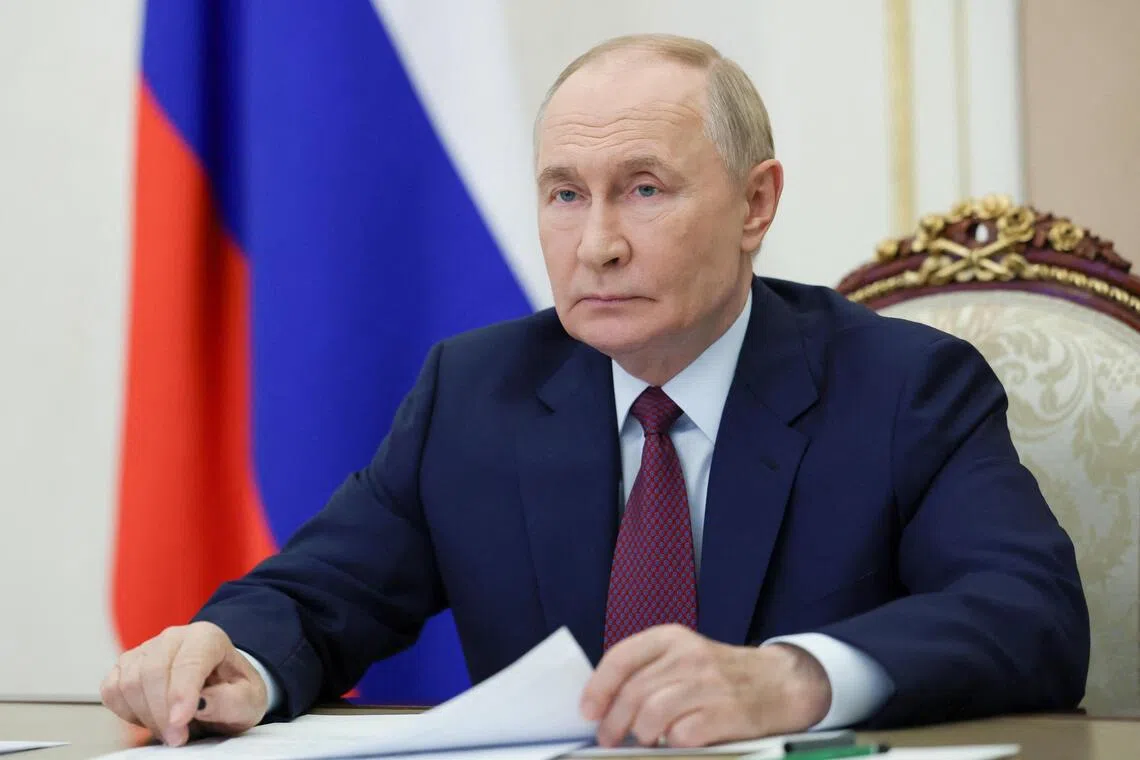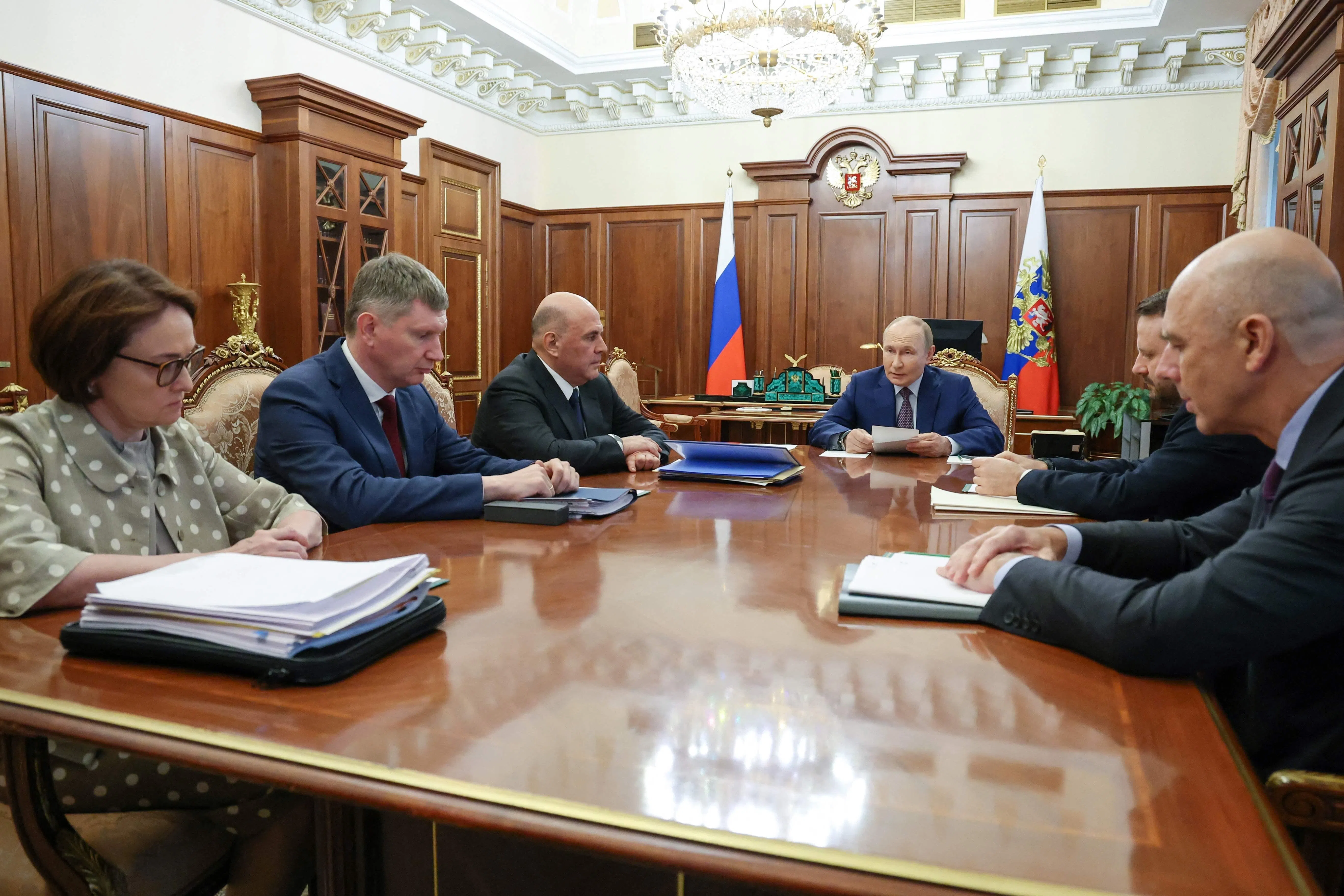Russia’s government looks for way to make ends meet as budget deadline looms
Sign up now: Get ST's newsletters delivered to your inbox

Russian President Vladimir Putin has given public assurances that there will be no tax rises.
PHOTO: REUTERS
Follow topic:
- Russia considers raising VAT to 22% from 20% to curb its budget deficit, despite Putin's assurances against tax hikes. This could halve the 2026 deficit.
- Increased military spending and social obligations limit possibilities for spending cuts, making tax increases the most viable option to balance the budget.
- Central bank governor Elvira Nabiullina cautiously supports tax increases over widening the deficit, linking deficit size to potential rate cuts for growth.
AI generated
MOSCOW - The Russian government is considering raising the rate of value-added tax to keep the budget deficit in check and maintain reserves, four sources told Reuters, despite public assurances from President Vladimir Putin that there will be no tax rises.
The draft budget is expected to be submitted to Parliament on Sept 29. Its key components are agreed with Mr Putin beforehand and are unlikely to be significantly altered during the formal parliamentary debate.
Russia, in the fourth year of its war in Ukraine, has raised personal income and corporate taxes this year, but the government still had to triple its federal budget deficit estimate to 1.7 per cent of gross domestic product (GDP) in May.
It is now set to exceed that target, according to an unnamed official quoted by state media this month. The 0.9 per cent of GDP deficit for 2026 included in a budget law in 2024 also looks likely to be exceeded.
Four sources close to the government confirmed a report this week by The Bell, a media outlet based outside Russia, that the government is discussing lifting the value-added tax (VAT) rate to 22 per cent from 20 per cent to curb the deficit.
The report did not specify a possible timeline for a decision, but one of the sources told Reuters it was being considered for the 2026 budget as long as the budget rule which sets aside windfall oil revenues remains in place.
“How can the deficit be reduced while adhering to the budget rule? Only by raising taxes, because there’s hardly anything left to cut, either military spending or social spending,” one source said.
VAT accounted for 37 per cent of federal budget revenues in 2024 and the possible increase could halve the projected 2026 deficit, according to Reuters calculations.
Russia’s economy has continued to grow despite tightening Western sanctions over the war in Ukraine. But GDP is expected to slow to around 1 per cent from 4.3 per cent in 2024 and inflation remains above 8 per cent in a country where much of the workforce and 40 per cent of revenues now go to defence and security.
Government spending is the key driver of economic growth in Russia, and with Mr Putin expressing displeasure at the economic slowdown and the need to continue financing the war of attrition in Ukraine, spending cuts are unlikely.
No final decision
Finance Minister Anton Siluanov has insisted that the budget rule, under which energy revenues collected above Russia’s target oil price, currently US$60 a barrel, are directed to the fiscal reserve fund, will remain in place.
After Russia sent troops into Ukraine in 2022, Western nations prohibited insurers and maritime service providers from facilitating Russian oil exports unless they were below US$60 a barrel. India boosted its Russian oil imports sharply but now faces pressure
The Russian fund, which is separate to the country’s central bank reserves, currently has about 4 trillion roubles (S$60 billion) in liquid assets, which can also be used to cover the deficit.
This year the government plans to tap the fund for 447 billion roubles.

Russian officials, including central bank governor Elvira Nabiullina (far left) and Russian President Vladimir Putin (fourth from left) attending a meeting on economic issues in Moscow, in August 2025.
PHOTO: AFP
Mr Putin, who in 2024 pledged no major changes to the tax system before 2030 following the tax hikes, which were introduced in 2025, has asked the government on Sept 5 to increase revenues through higher productivity, not taxes.
The source who said there was little room for cuts in the federal budget, argued that military spending could not be cut and minor cuts in the social sphere would not help much.
“It is like shearing a piglet – lots of squealing, not much use. If we could cut 1 to 2 trillion roubles, sure, but you can’t cut amounts like that, they just aren’t there. You can trim a few million, maybe hundreds,” the source said.
Growing concern
A two percentage point 2019 VAT hike contributed 0.6 percentage points to inflation that year, according to the central bank, which has pledged to halve inflation to return it to its 4 per cent target.
However, central bank governor Elvira Nabiullina cautiously backed a tax increase, saying after the Sept 12 board meeting that it was better to raise extra revenue than to widen the deficit.
She linked the size of the deficit to the central bank’s ability to cut rates further from the current 17 per cent, a level economists see as too high to revive growth.
Mr Putin has said that Russia’s low level of debt allows it to borrow more and that new debt should not be feared, but rates even for the government are around 13 per cent, with interest expenses expected to reach 2 per cent of GDP in 2025. REUTERS

